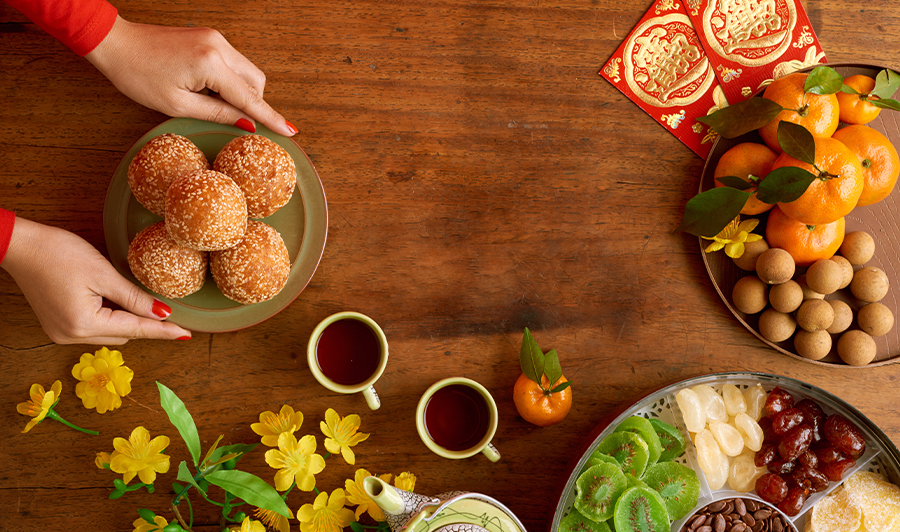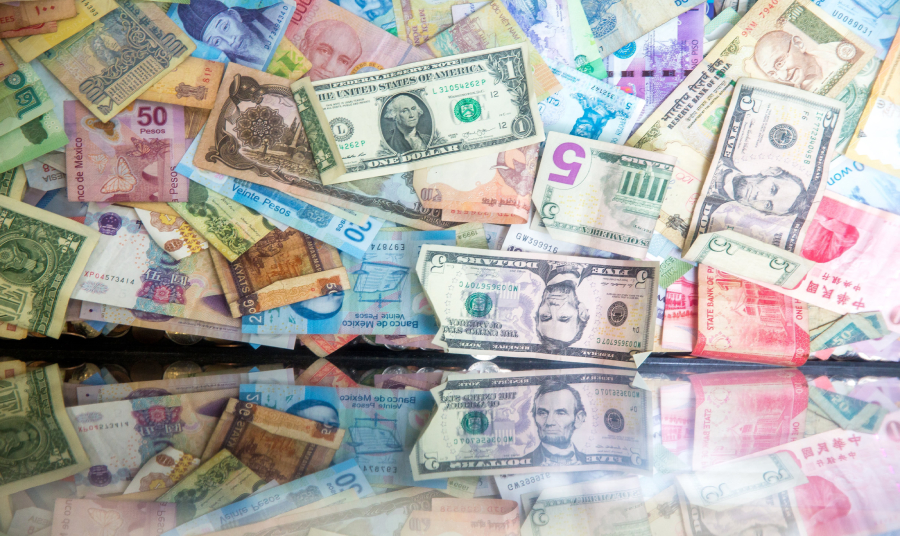A seller’s guide to Chinese holidays and traditions
There are numerous e-commerce opportunities for your business within the Chinese event calendar. Discover which ones you can focus on and begin growing your business today.

Save the date! Or, rather, save these dates. Taking advantage of Chinese holidays and traditions can be the perfect way to complement your domestic business and increase your total revenue. After all, China is the largest e-commerce market by both the number of e-commerce sales and revenue in the world.
In this article, we will provide a rundown of major holidays and traditions planned throughout the year in China that you should mark in your calendar, and how you can take advantage of them while minimizing costly currency exchange fees.
- Official Chinese holidays and traditions
- Other important Chinese holidays and traditions
Official Chinese holidays and traditions
Officially, China has seven public holidays across the year, the dates of which are published by the government each November. Click here to view the current calendar for 2023.
Given China’s vast and diverse population, the country also has several other culturally significant holidays and traditions that may be of interest to your e-commerce business. They’re not officially recognized, but that doesn’t mean they’re not popular — and they still offer lucrative sales opportunities. We’ll return to these other events in a later section; below are the seven main Chinese holidays and traditions that you should focus on.
International New Year
Did you know China traditionally used a different calendar system than many other Western nations? Although modern China uses the Gregorian calendar (based on the earth’s rotation around the sun) for business and commerce, many cultural holidays and traditions within China are still determined using the lunar calendar system.
Despite these differences in calendars, China’s celebration of the new year on January 1st is an example of where the two cultures of modern and ancient China meet. Though the Chinese lunar calendar doesn’t align with the Gregorian calendar, people across China still recognize and celebrate the beginning of the new year on January 1st.
Public holidays within China typically last either three or five days. However, next year (2024), because January 1st lands on a Monday, the New Year’s Day holiday period will be marked as a public holiday (like in the US).
Many retailers in China offer discounts as seasonal goods go out of demand, following a similar sales pattern to Western retailers during post-holiday sales in January.
Spring Festival (or Chinese New Year)
Undoubtedly the most prominent of all traditional Chinese holidays, the Spring Festival or Chinese New Year, signals the commencement of a new year according to China’s lunar calendar. This festivity occurs in early February and is the oldest and most important annual event for Chinese citizens. Over the last decade, the celebration has witnessed a consistent rise in revenue as individuals indulge in extravagant celebrations with their loved ones.
The Spring Festival is a significant Chinese holiday, extending 16 days until the Lantern Festival. Although the Lantern Festival is not officially recognized, the Spring Festival is allotted only seven days for celebration, making it one of China’s two “Golden Weeks” each year. It is noteworthy that even though the Spring Festival’s duration is just a week, it is still lengthier than the typical three-day festivity observed for other holidays.
The festival’s key features include vibrant red decorations, captivating lion dances, stunning fireworks, and a plethora of delicious foods, such as dumplings, spring rolls, fish, noodle dishes, and sweet rice balls. The color red holds immense significance as it symbolizes happiness, good fortune, and good health. During the Spring Festival, it is customary for people to exchange red envelopes filled with money with their loved ones.
In 2023, the lunar new year commenced on January 22nd, marking the start of the Year of the Rabbit according to the Chinese zodiac system. Spring Festival 2024 falls on February 9th and will mark the Year of the Dragon. So, don’t forget to wish your Chinese contacts a ‘新年快乐 Happy New Year!
The Lantern Festival
As mentioned, although The Lantern Festival is not officially recognized, it marks the end of the Spring Festival around 16 days after Chinese New Year.
As its name suggests, lanterns are a central part of the cultural event. Lanterns are traditionally decorated with riddles and puzzles, which people spend time solving. Lion dances, rice flour treats, and softly lit art pieces are also featured.
Qingming Festival or Tomb Sweeping Day
The Qingming Festival (or Tomb Sweeping Day) is another family-centric event lasting around three days in early April. Celebrants honor ancestors and more recently deceased loved ones by leaving small gifts, burning fake money, and cleaning their graves or family shrines.
Given the considerable size of China’s migrant worker population, many celebrants travel to rural communities where family shrines and graves remain. Chinese nationals typically enjoy spring outings and kite flying as the weather also improves around this time of year. Cold dishes are traditionally eaten the day before people visit their families’ shrines, with green rice balls, peach-blossom porridge, and snails cooked in soy and ginger enjoyed afterward across the rest of the festival.
Labor Day
Labor Day, or International Workers’ Day (or simply May Day), is another international holiday recognized by the Chinese government. This celebration takes place around the beginning of May, lasts up to five days, and focuses on workers’ efforts, rights, and struggles. Businesses close during this holiday break, and workers can spend time with friends and family.
People in China often celebrate Labor Day with a shopping spree or a sightseeing trip. Attractions traditionally offer discounts, and street parties are common.
Dragon Boat Festival
Returning to China-specific holidays, the Dragon Boat Festival lasts around three days every June. This traditional Chinese holiday is ancient, dating back around 2,000 years. The Dragon Boat Festival celebrates Qu Yuan, a famously patriotic poet. Cities across China host races with contestants using boats shaped and decorated like the festival’s namesake to honor his death.
June has superstitious connotations in China, and it is thought to bring natural disasters and illness to the country. For this reason, Chinese nationals celebrate well-being and health, participating in outdoor activities to ward off sickness.
Finally, the Mandarin translation for ‘Dragon Boat Festival’ features a similar word to the number five. In addition to traditional rice dumplings and wine festival favorites, many celebrants enjoy foods with ingredients that play on the ‘five’ association.
Mid-Autumn Festival
The mid-Autumn festival (also known as ‘Moon Festival’ or ‘Mooncake Festival’) is another ancient Chinese tradition, with similar versions seen across South-East Asia. Occurring in late September or early October, the holiday is similar to America’s Thanksgiving, emphasizing time with family.
Though the mid-Autumn festival is the second-most important in traditional Chinese culture, the government only designates three days for its celebration. National Day (see below) is more important in contemporary China. Those celebrating during the Mid-Autumn Festival gather for lavish dinners, releasing lanterns in the evening and enjoying mooncakes, a traditional pastry.
Different regions of China have varying consumer preferences for mooncakes’ shapes, ingredients, and fillings. If your business partners with a wholesale bakery to sell these traditional pasties before the festival, be wary of these regional preferences to maximize your sales.
National Day
Like America’s July 4th celebration, China’s National Day remembers the country’s founding on October 1st, 1949. Unlike other traditional Chinese holidays that vary with the lunar calendar, China’s National Day is fixed to this date from the Gregorian calendar, with six additional days added, making it China’s second Golden Week.
The Mid-Autumn Festival can sometimes overlap with the National Day holiday period due to variations in lunar cycles each year, and 2020 was the latest year to see this co-occurrence. Even in years where this isn’t the case, celebrations of the nation’s founding are large, with firework shows, food, and cultural events blending ancient and contemporary elements hosted across the country.
Other important Chinese holidays and traditions
Though the Chinese government officially recognizes seven public holidays of varying lengths, China’s diverse population celebrates other traditions and cultural events. Below are some of the main ones to remember alongside the seven listed above.
Chongyang Festival or Double Nine Festival
People celebrate the Chongyang Festival in mid-October by going on hikes and enjoying the chrysanthemum flower — including cakes and wine that feature its flavors.
The Chongyang Festival emphasizes celebrating (and caring for) older relatives, including visiting the graves of those who have passed and burning paper clothes as offerings.
Singles’ Day or Double Eleven Day
No seller’s guide to Chinese holidays and traditions would be complete without mentioning Singles’ Day. Singles’ Day (or Double Eleven Day) contrasts Double Sevens Day (China’s version of Valentine’s – see above) and was initially a day for single people to celebrate themselves.
Since 2009, e-commerce platform Alibaba has offered discounts on goods in honor of the day and has helped turn Singles’ Day into the largest e-commerce event in the world. The last decade (2011-2021) has seen explosive revenue growth as consumers buy various goods to treat themselves, including skincare products, makeup, clothes, shoes, electronics, personal items, and more. 2021 saw particular successes with e-commerce sites Tmall and JD generating record revenues of $74.56 billion (Tmall) and $48.17 billion (JD) – easily eclipsing 2022 Black Friday spending in the US.
Despite a migration to online sales events over the last ten years, the Singles Day tradition still offers people a way to meet offline for dates and the chance to find love. If your e-commerce business is eyeing Singles Day as a growth opportunity, make sure to do your research on popular goods across all consumer demographics.
Accept Chinese payments seamlessly with Zyla
Regardless of the e-commerce event(s) you choose to participate in next year, your business will need to handle currency exchanges from selling into the Chinese market. Thanks to advances in transportation and communication, selling in China is easier than ever, but it can still seem daunting.
Time differences and physical distances can make business relationships seem out of step, but currency transfers need not be anymore.
With a Zyla Account, you can open multiple local currency accounts for free, making it easier to pay partners, suppliers and staff. So, whether you’re buying products from overseas or organizing shipping, the Zyla Account’s got you covered. Open an account today and you could be approved, set up and trading internationally in 24 hours. Get started or find out more by calling (855) 797-3366 today.



